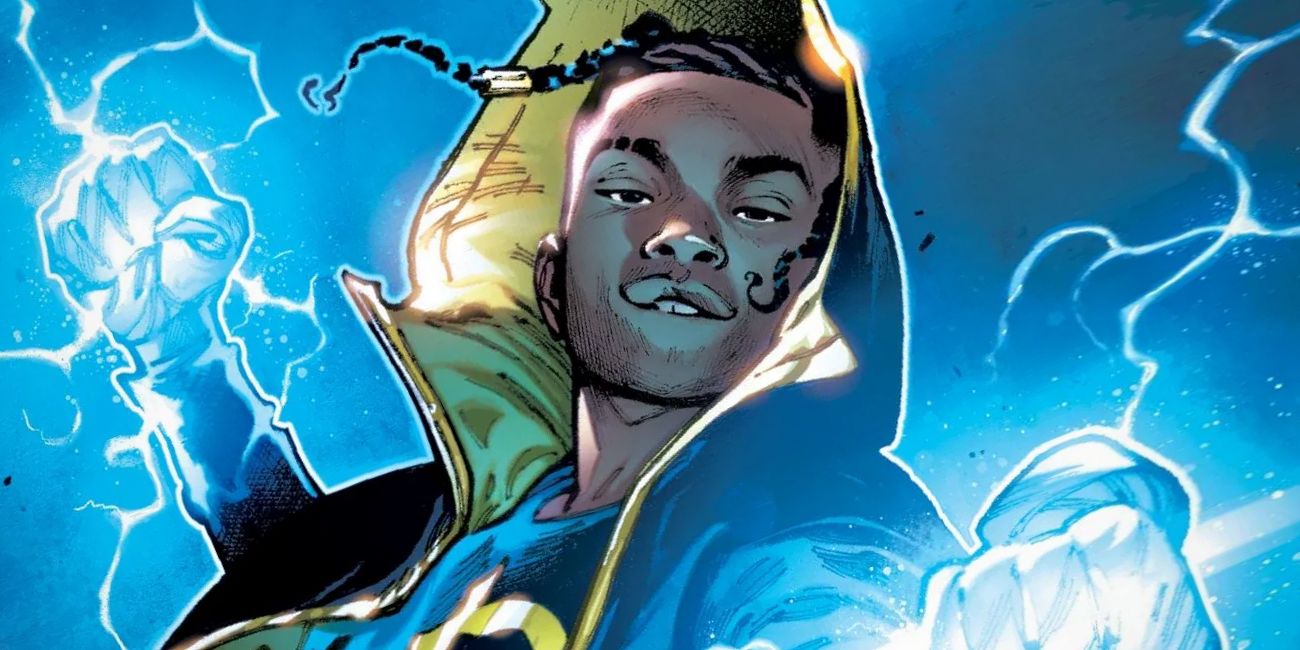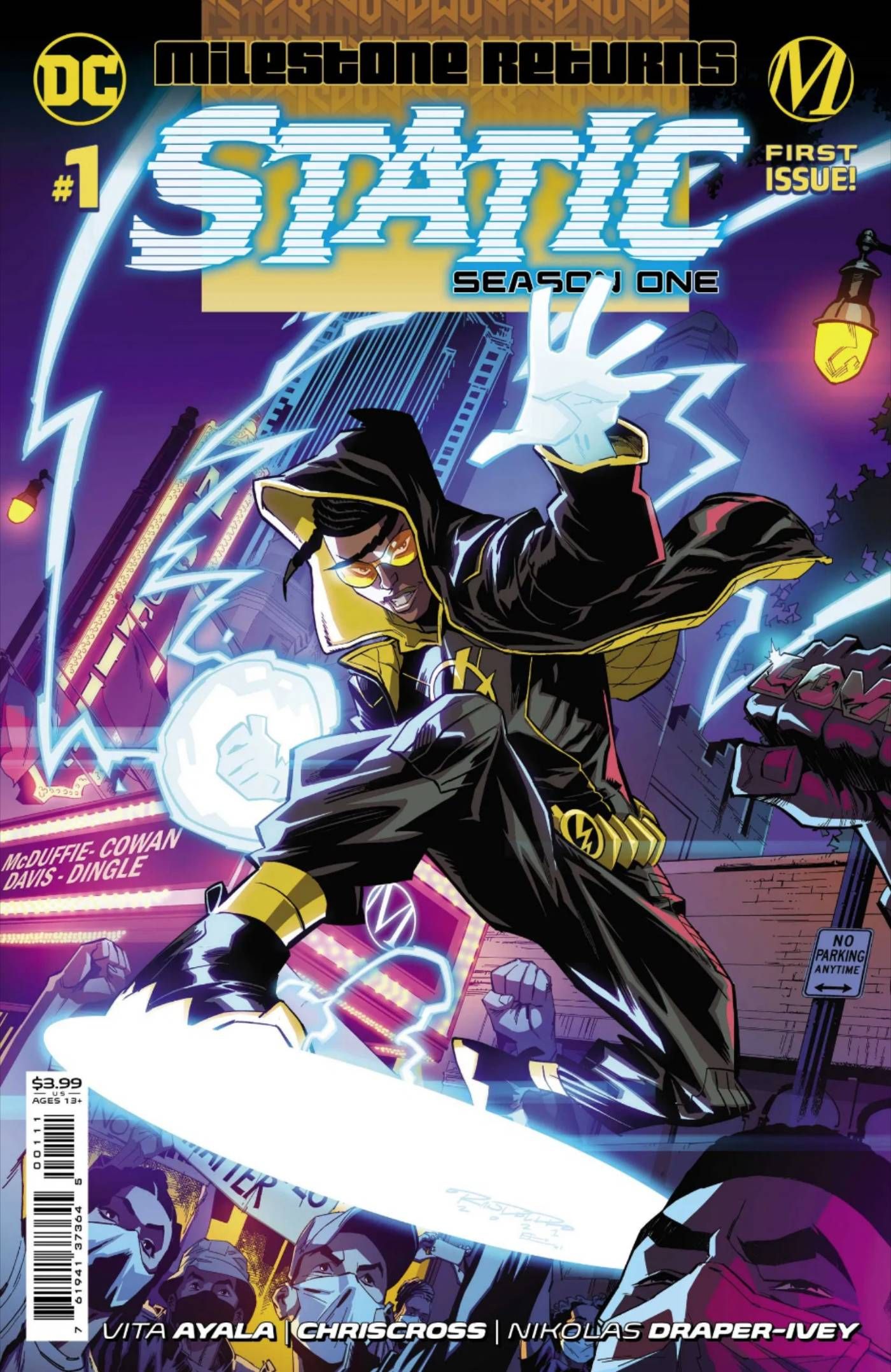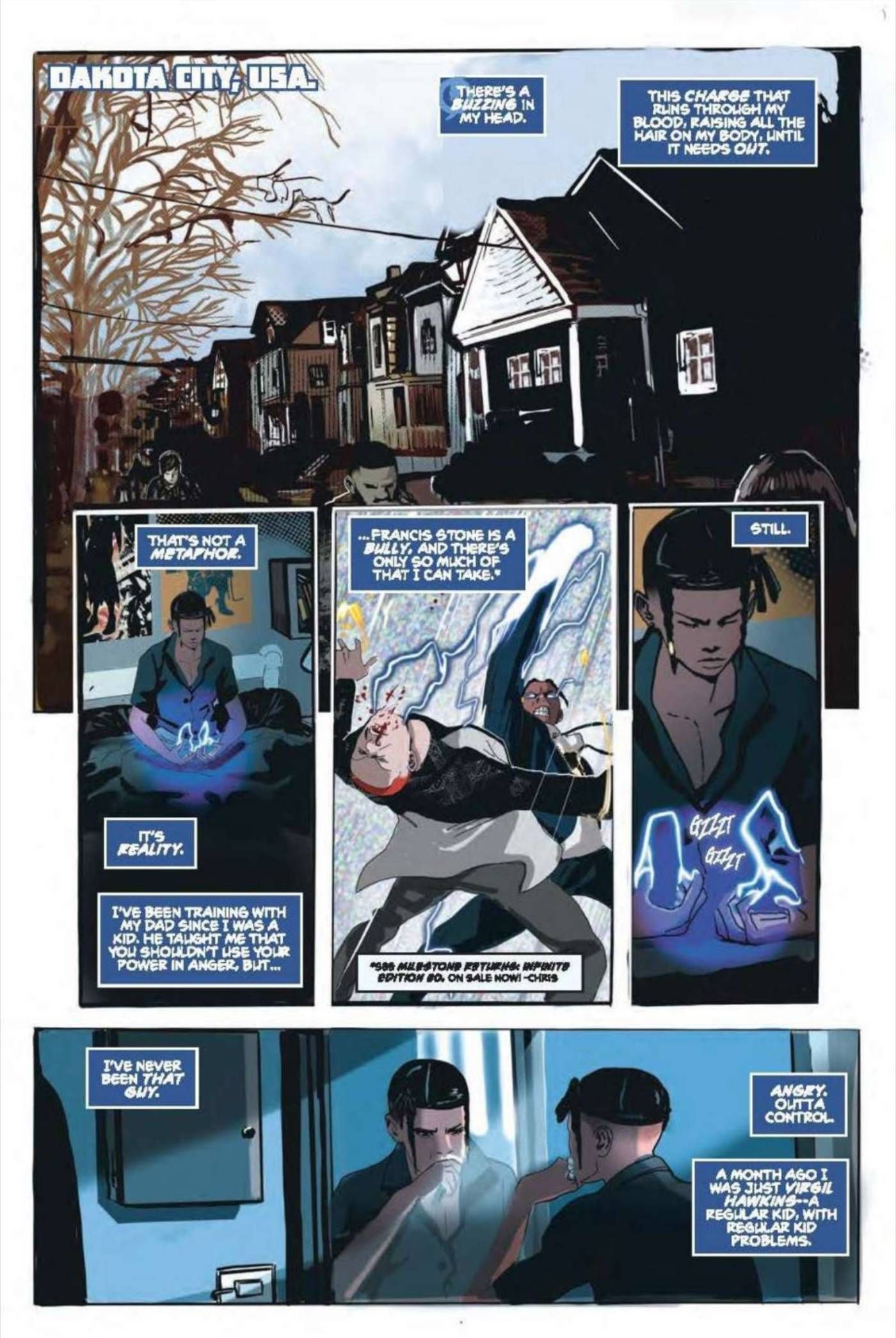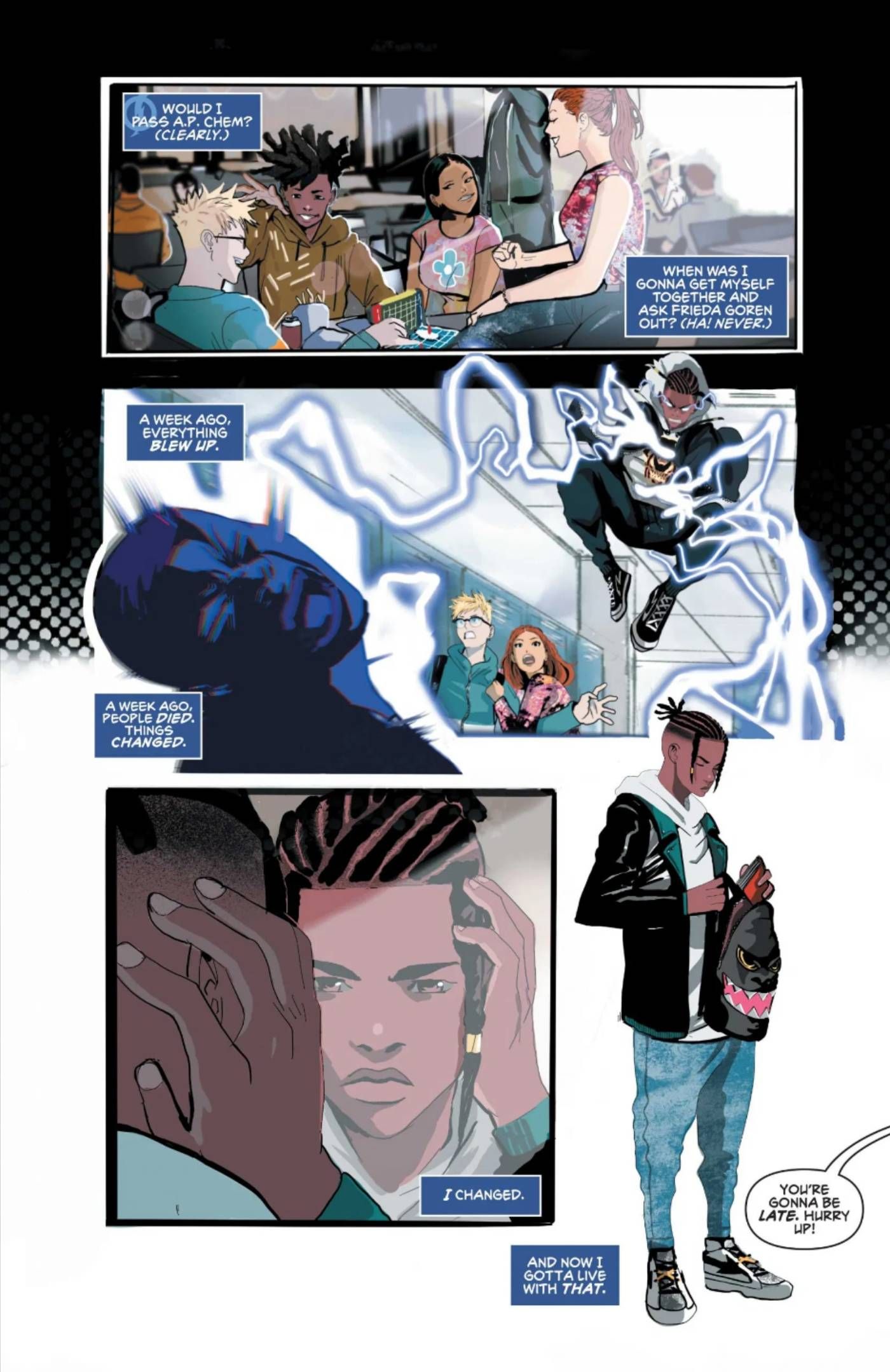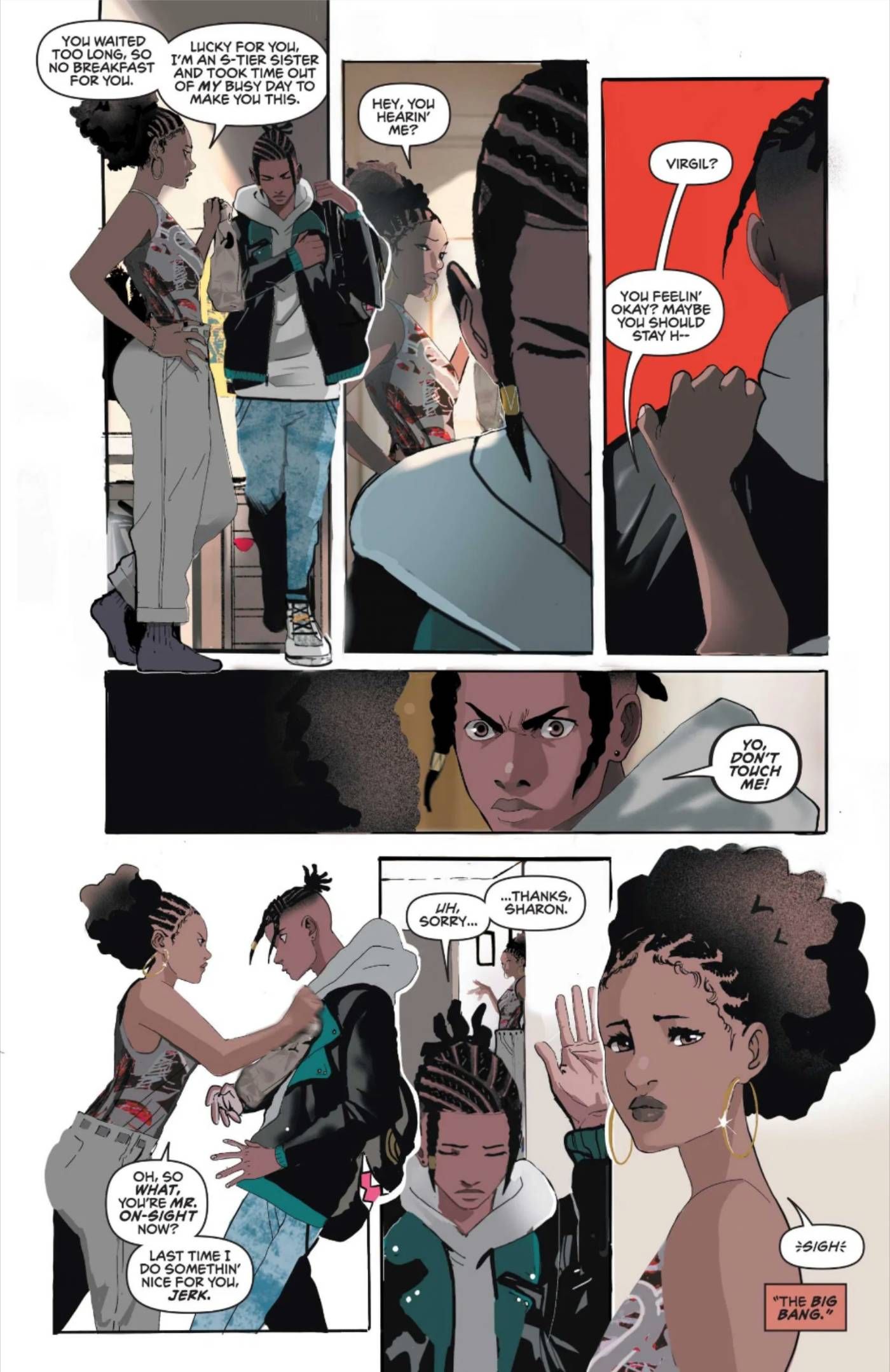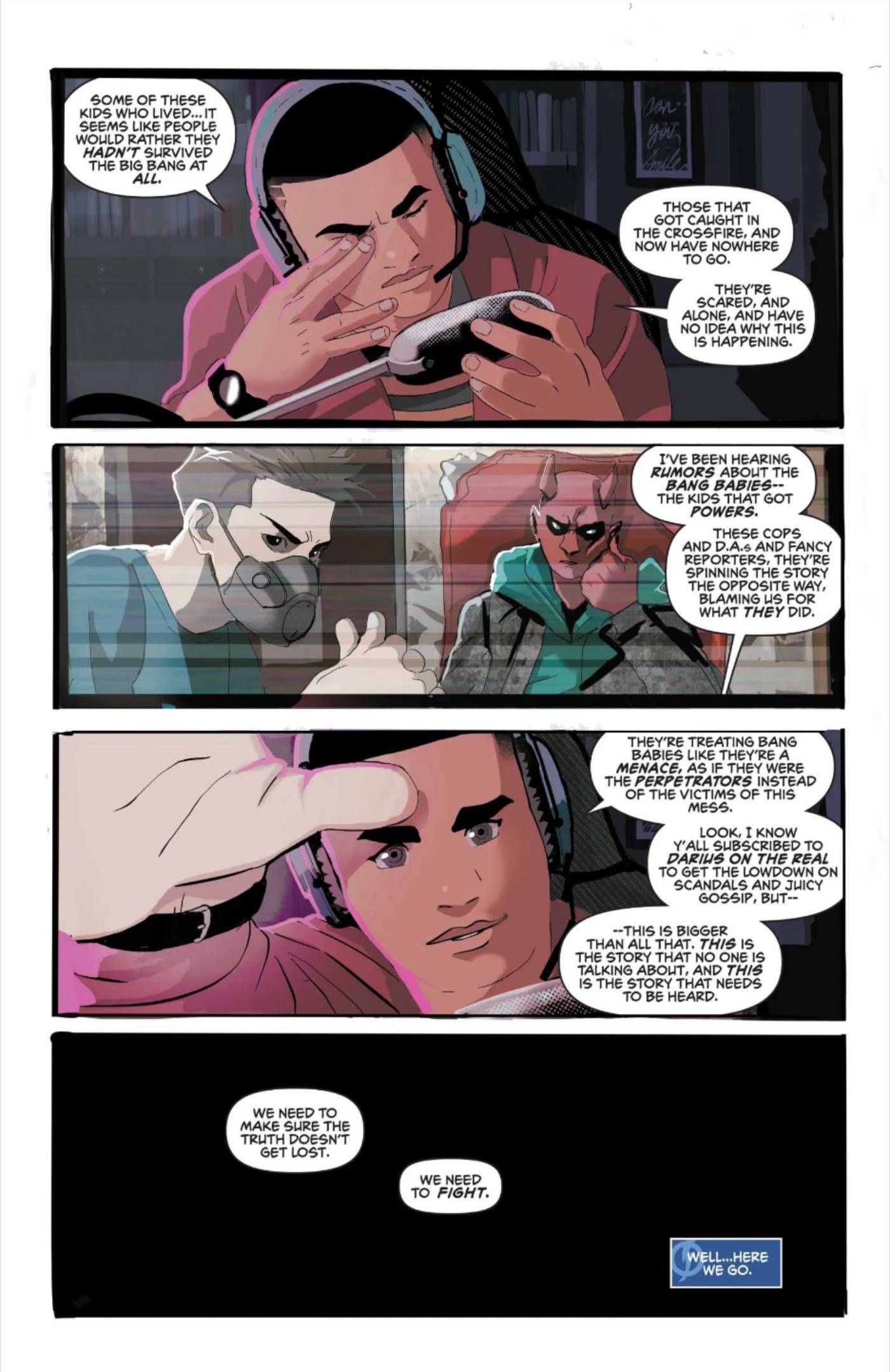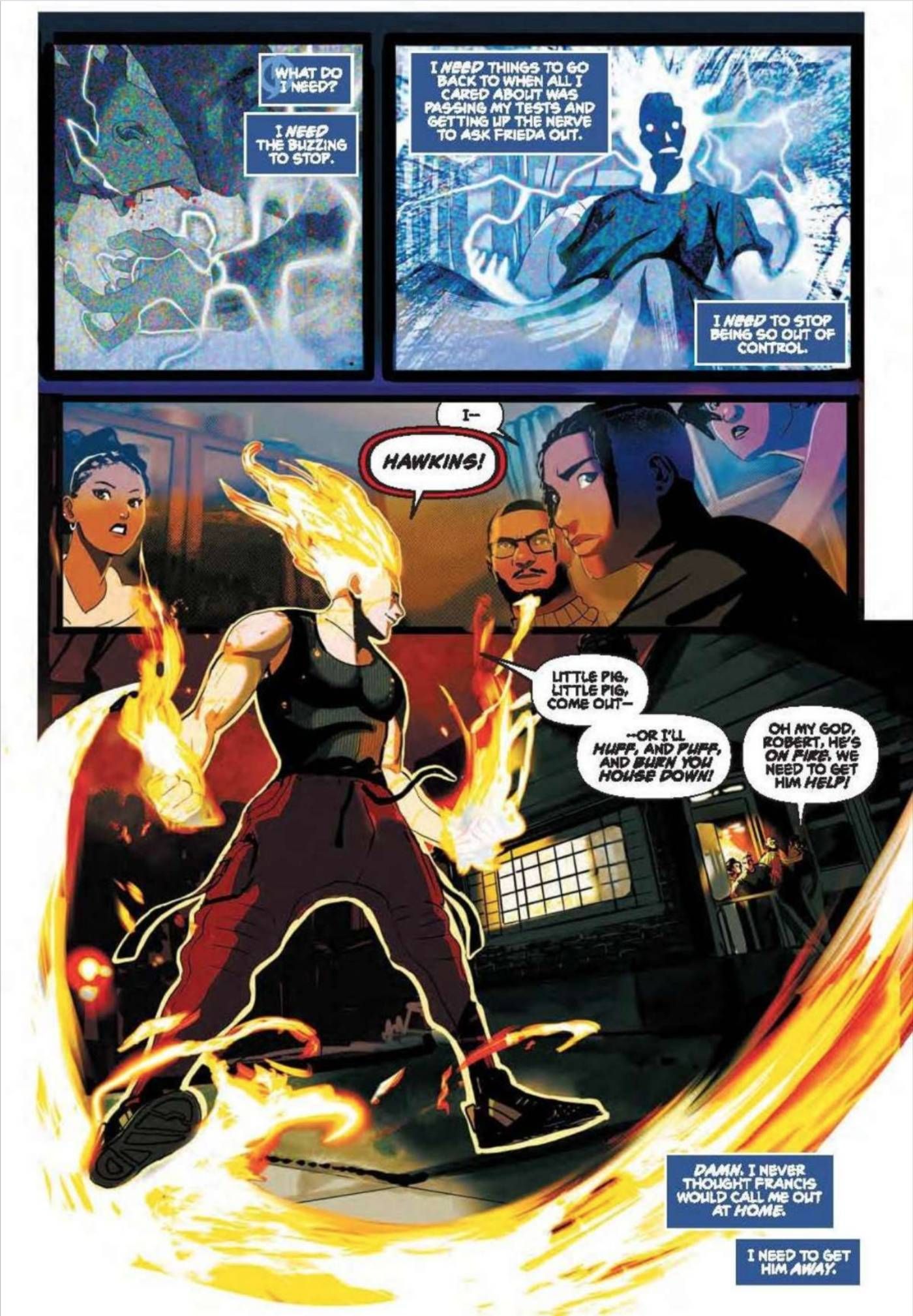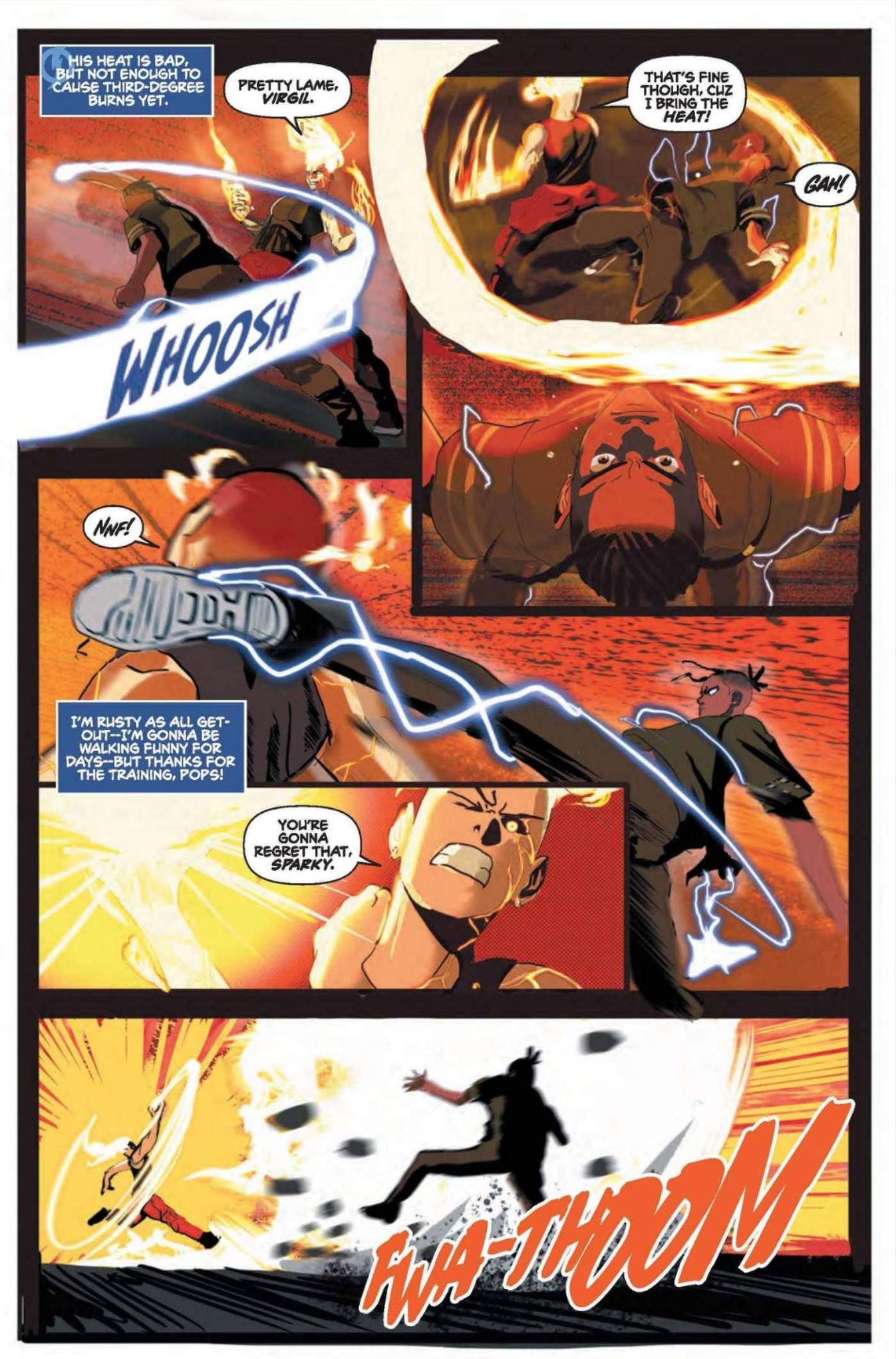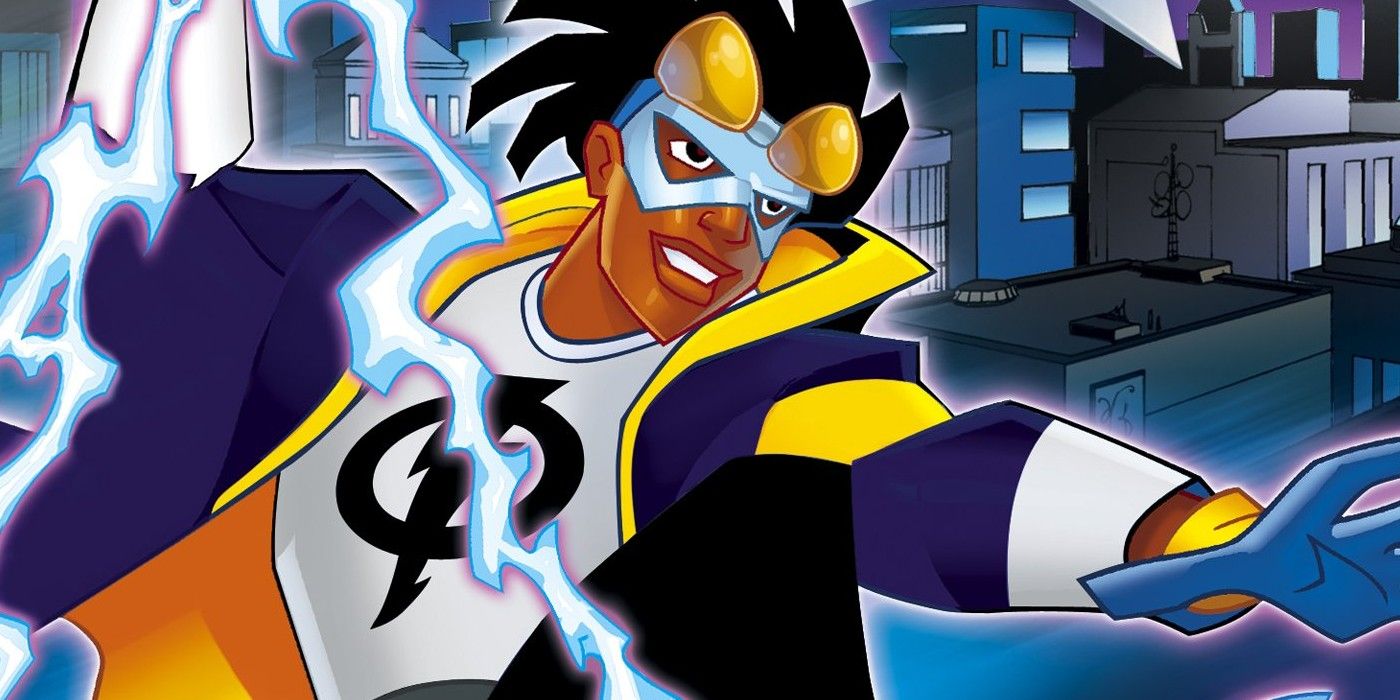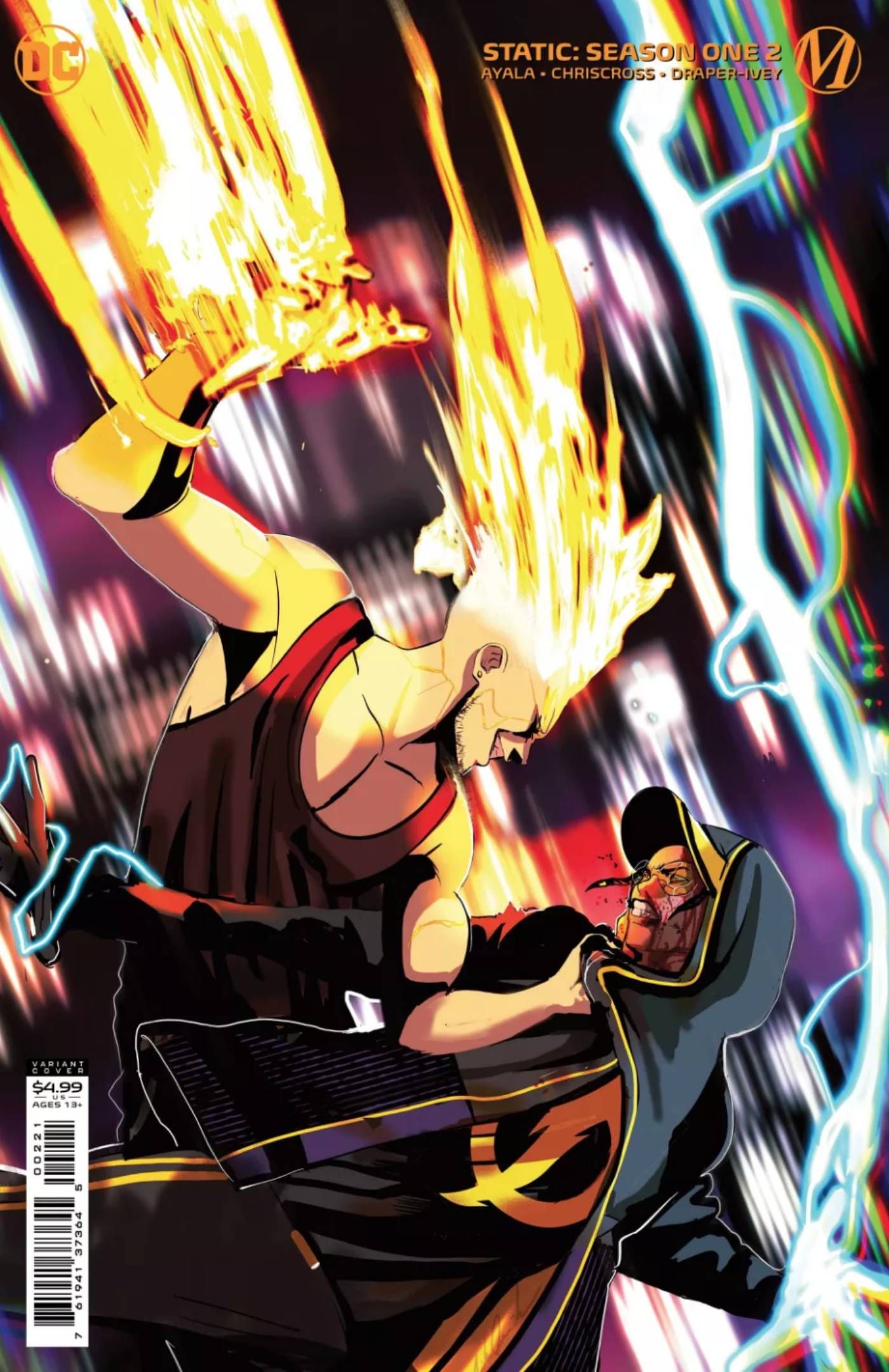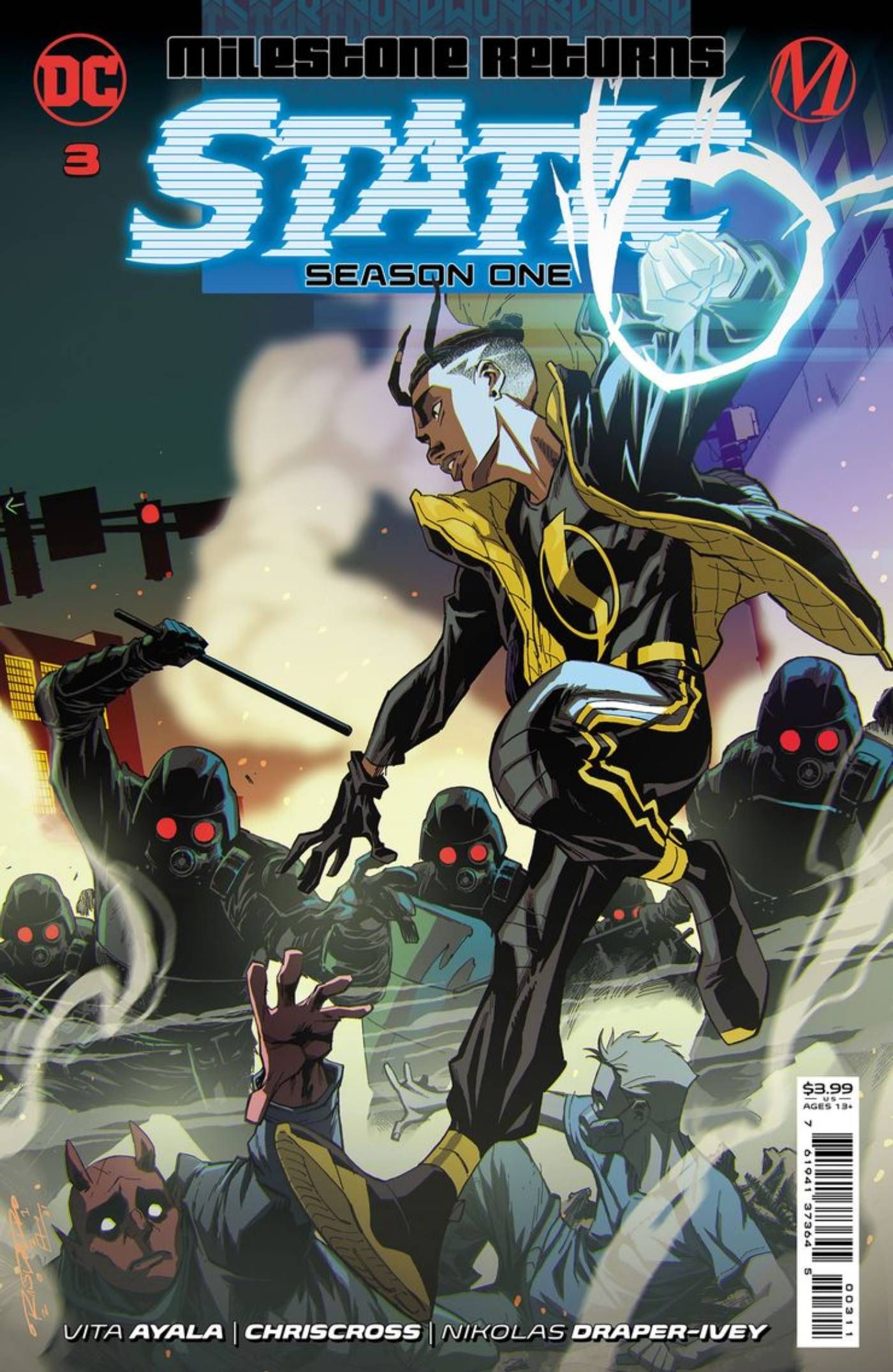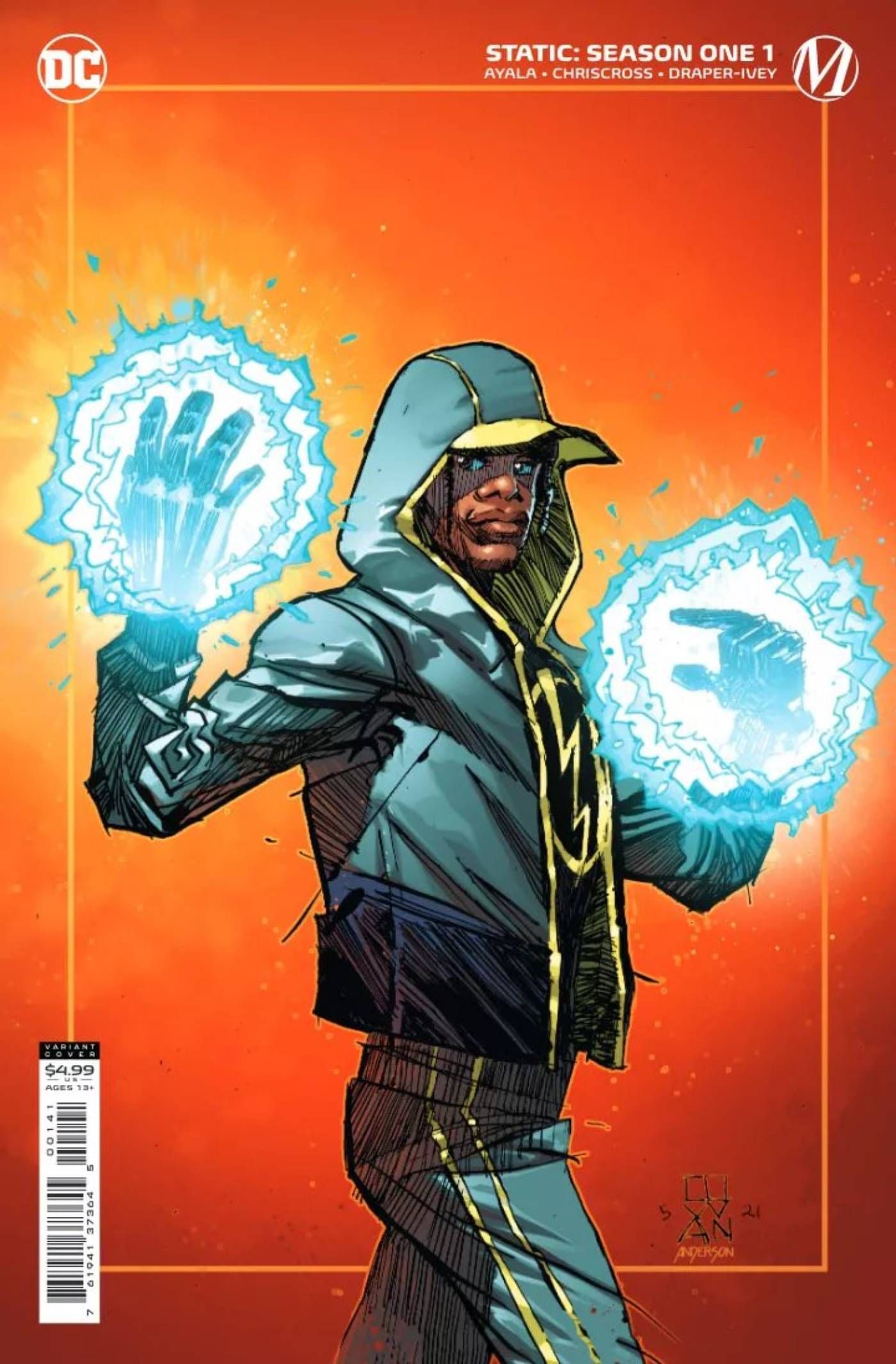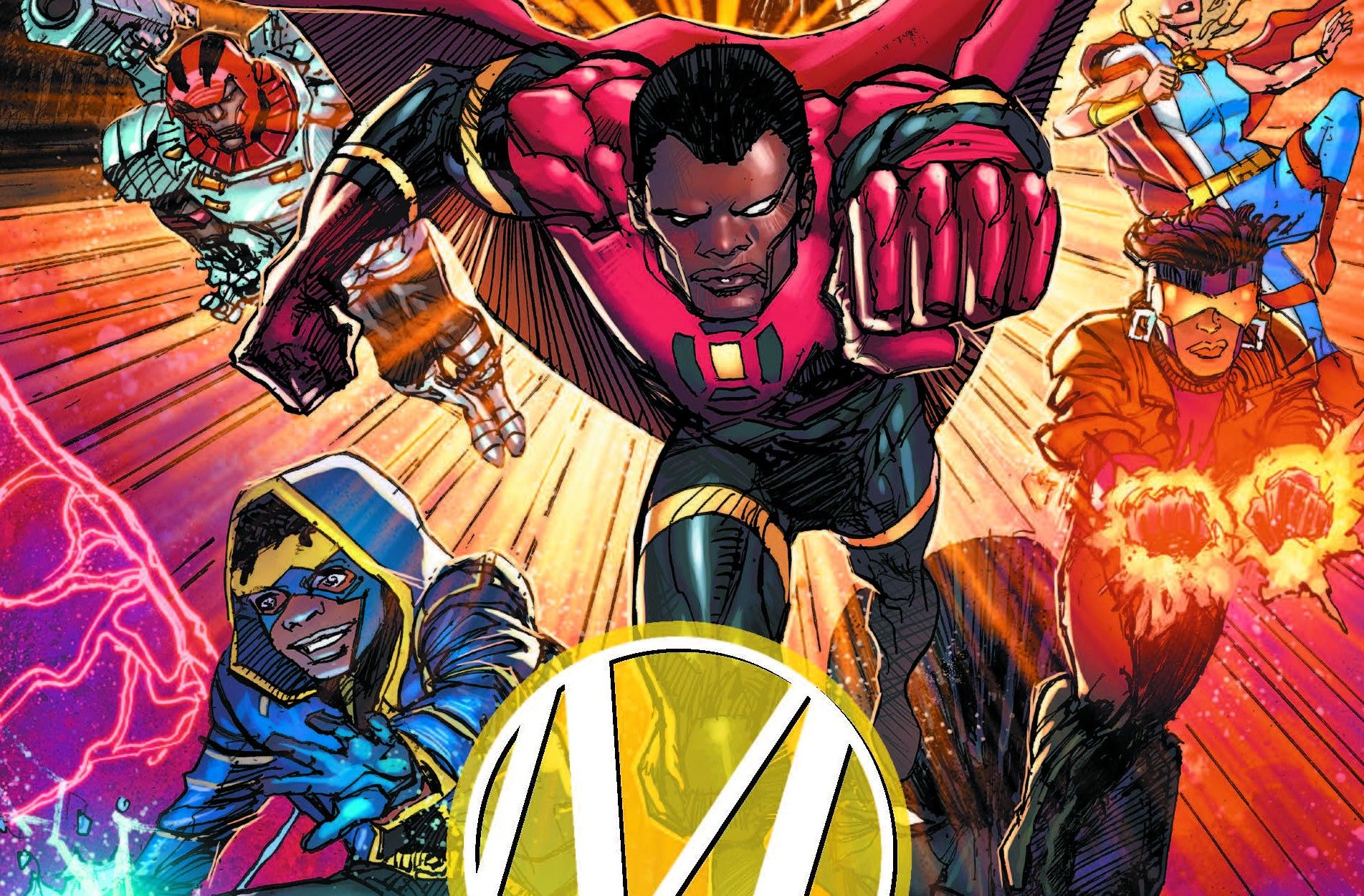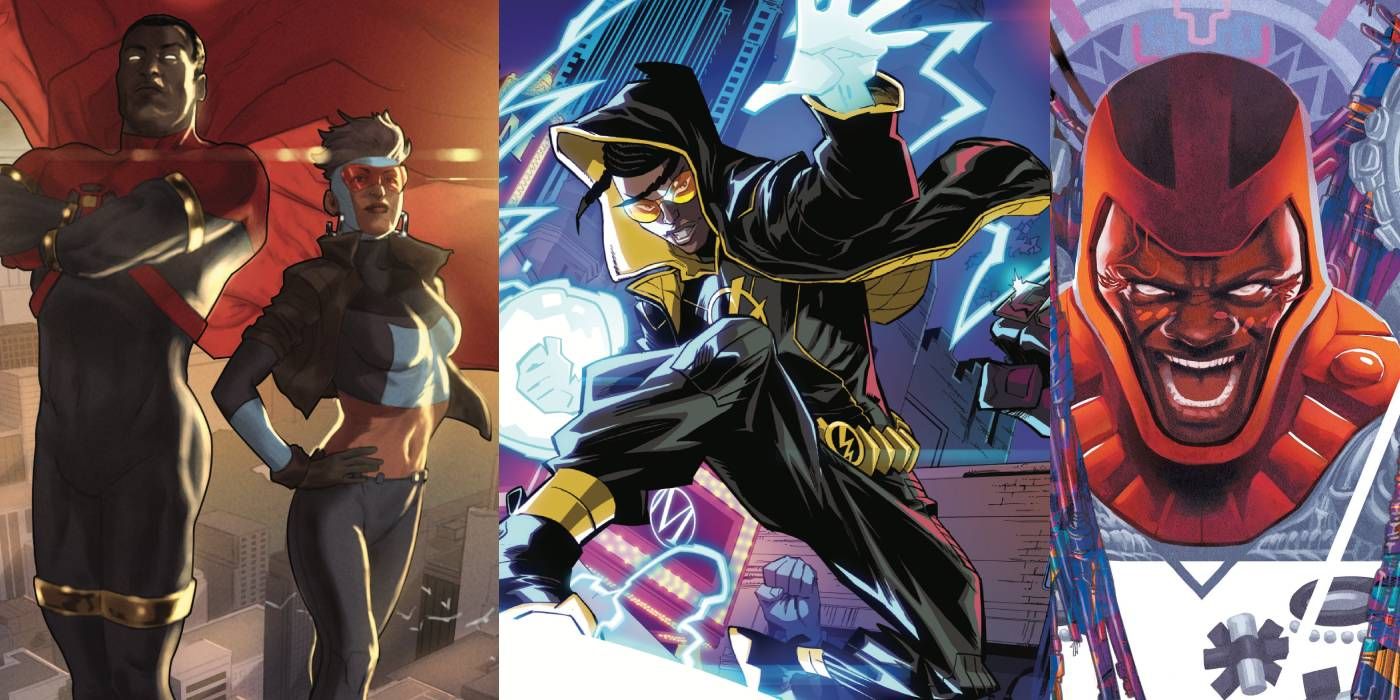After far too long for his fans, the superhero Static is making his glorious return to the spotlight in Static Season One. As the first of three new series relaunching the Milestone Universe in DC Comics, the book is already showing a sign of things to come as the old becomes new, and the timeless becomes more timely than ever.
The electrically-charged Virgil Hawkins has earned a sizable fanbase since his debut series, originally from writers Dwayne McDuffie and Robert L. Washington, and artist John Paul Leon. The memorable teenage metahuman helped put DC's Milestone imprint on the map, eventually becoming a household name for an entire generation through his animated series, Static Shock. Now Virgil will be the first of the returning Milestone legends to being a brand new life in comics, and Screen Rant was fortunate enough to learn about the legacy, the relaunch, and the future of Static from the new creative team directly.
Readers can find our full interview with new Static Season One writer Vita Ayala and longtime Milestone artist ChrisCross, as well a a preview of the new book's first issue, embedded in full below.
What is it like creating this book in the shadow of Dwayne McDuffie and John Paul Leon?
ChrisCross: It's kind of deep, but I was actually a part of the old guard. Being part of the Milestone family and being one of the originators, with John Paul Leon and Dwayne McDuffie no longer here. Never thought I would have said that in one sentence.
I think, since John Paul Leon and I kind of came in around the same time, we always had this friendly competition about artwork. I was always impressed with his abilities, and Dwayne McDuffie was sort of like a mentor to me in a way. We were always talking about basketball a lot, and what we would do to D-up on each other on the court. You see another six foot six or six foot nine [person] walking up to your door, first thing you want to think about is D-ing Up on somebody.
They're two really amazing geniuses in their own right. I don't think anyone has drawn like John Paul Leon. No one is drawing like that brother. I have not seen anyone try to even adopt it, other than Tommy Lee Edwards, who was part of his studio. Even Bernard Chang was influenced by him--you can't not be influenced by him being in his studio.
I was always amazed by John Paul Leon's work. He always made me think deeper; he always made me want to do things more cinematically. The amount of stuff that brother could put in the panel - and what he could do with a panel just by placing one particular figure in one place and all this extra negative space - it was so Alex Toth. There was so many things that he wound up being a master at, and I'm always hoping that something bigger comes with his work now that he's passed away, even though it's a shame that would have to be a post mortem thing. It's kind of weird that people start to become very famous after they've done their work.
But as far as I'm concerned, I'm biased. No one's really held a candle to [his] work. Or McDuffie's, if you ask me, because they were both very focused and very intelligent people. And they were quirky, just like the rest of us too. That's a very, very, very cool combination, I think.
To see Static, coming back, especially next week, it's surreal that I will be a part of that. I'm glad that I am, but it's very surreal. I just hope that people really like it. I think Vita's trying their darndest to make sure to get the spirit of Static, in the way that they can twist it in order to make it more palatable for the fans. And hopefully, it's going to be just as iconic. Just kind of living in Virgil Hawkins' air space for a bit, so only [Vita] could tell you how that feels right now to follow Dwayne McDuffie and Robert Washington III putting that stuff together. It's daunting. I'm doing layouts, so it's daunting even doing that stuff. Because every single time I put my finger to that page, I'm being transported back to 1983. It's kind of weird to tell myself, "No, dude, this is 2020. It's not that Virgil anymore. You've got to do this stuff now." It's kind of weird. It's like an alternate universe; really weird.
But I'm having fun with it. I hope everyone loves the stuff that me and [artist Nikolas Draper-Levy] are putting together, and Vita is actually the Dreamweaver. We'll see how it goes from here, but I would say that the kick that's happening through the internet is doing really well. I think it'll be even more successful than what the last time, which is an even better thing. I think everyone was trying to be woke, whatever woke is, and we were just doing what we were doing. I'm just glad that the audience has caught up to what we're doing now. Because before, it was kind of... I have stories. We'll be here all day. So, I'm just glad that people will love the stuff that's happening now.
Vita Ayala: First of all, don't let Cross fool you. This man's loose layouts are other people's finished inks... I'm just saying, if we wanted to, we could just color right it. I talked about this yesterday, but for me, it's a manifesting. I was trying to manifest something, like a dream of mine is to have Cross doing Blood Syndicate. I'm not speaking for DC; I'm speaking for myself, because I'm a big noir fan and I think that Blood Syndicate leaves a lot of room for that. And I think Chris will kill it. And again, just his loose inks would be like finished [art].
But for me, it's so daunting that I can't think about it. You can't follow someone like Dwayne McDuffie. You can't; it's not possible. That man wasn't just a genius, he's one of the reasons why I do what I do. Before that stuff, I didn't really think it was possible for black people to do "for us by us" work in comics, because that's not what we've seen. And then I've been following his work across all the platforms that he's used; all the media that he's used. To me, he's a hero. Same with John Paul Leon, that guy's untouchable.
So, I think that what we're trying to do is, instead of follow up, it's trying to honor what their goals were. For me, what I'm trying to do is to be as authentic to both the character and the moment as I can be. And I think that's the only way that the imposter syndrome won't crash me into dust
ChrisCross: I think you’re going to be fine. It's not an issue. But I wonder how's the flowing with you? They're say, "Hey, you have this blank slate," versus the slate that you had before. What is your muse?
Vita Ayala: I talked extensively with Reggie and Denys - mostly Reggie. Denys is very quiet, but then he comes in and says very knowledgeable and wise things, then backs out. Reggie and I just go back and forth. But I read Reggie's script, and I saw overall what they had for the Milestone relaunch. And I went, "Okay, that that's my inspiration. How do I tell a story about this version of Virgil Hawkins?"
And my brief was - this is not a secret or a spoiler at all - you're starting before we have started in Static stories. Usually he's Static, and then you get little flashbacks, but you're seeing him be a superhero. But I was told, "You're getting him to that place." That's what we're seeing now. We're seeing directly after this huge traumatic event in his life, how does this boy rebound and heal enough to become the Static that we know and love? That's my North Star.
One of the creative choices in this book, which is distinct from both the '93 series and the cartoon, is the depiction of Virgil's family. What was behind that decision?
Vita Ayala: That's a great question. And I will say, that was very important to me and Nik, because we talked about it. And also Reggie, because my original conversation was with Reggie in the room. I was like, "Hey, I want to depict a black family that is together and, maybe not perfect, but unified in a way that I actually know black families to be."
Every family has its hard times, but I think the default in a lot of comic books is to go, "one parent, someone's dead, or this or that." And I was like, "We don't have to do that. We can show you a family who is going to try get through this really intense traumatic thing together." To me Virgil is a character who's clearly very loved and very supported, even though he's kind of weird. I was also kind of weird as a kid, so I wanted to show that you get that through this kind of support. Maybe they don't always understand you, but they love you and they're trying to do their best. And everyone was down with that.
ChrisCross: He's a little angsty, to the point that I want to smack him myself.
Vita Ayala: I mean, he's just seen his classmates die.
ChrisCross: Definitely. You understand he's going through it. He was in a place where all of his homeboys was at; all his classmates. And then this gas comes up, and everyone's melting and mutating...
Vita Ayala: I've seen terrible things, and I can't fathom that. They melted! They melted, and then some turned into monsters.
ChrisCross: I saw it twice now! First in 1993, and now I'm seeing 2020. What are y'all doing to me?
Vita Ayala: What do you think about the difference between the origin story in '93 versus the stuff that Reggie set forward here?
ChrisCross: Well, I think that Reggie saw what was there, and saw what was happening now, and just said, "It'd be perfect if we made this [story]." Lord knows the Black Lives Matter movement is going through a lot of political storms right now. No matter what you do, a lot of people are against it. Even seeing what's happening with the country now. when it comes to voter registration and voter rights and stuff like that. People are doing things in front of you, and then looking at you saying, "It didn't really happen. We didn't really just do that to you." You're supposed to accept that.
I guess like that situation, you have what's happening in this book. Like, you just saw a kid blow up, basically turn into a deer, and run off. "You didn't really see that. You have to let that go. Don't talk about it." So, I guess I understand where Virgil Hawkins is coming from. He's still having that playing around in his mind, but he's still trying to be who Virgil Hawkins was before all that happened. And I see how you're trying to write all that, and how you're trying to move it.
Then you've got some of the other kids, who were probably pretty much destitute in some ways and just evil in others. They get this particular power, this manifestation of the talisman that became who they were, and they just amped up their attitude based upon that power. So, they were evil before, and they had little psychotic episodes here and there. Now they have this power, and they're like, "I can do whatever the hell I want."
It plays off a serious human trope, and a trope that's kind of unique to the Milestone universe. When you deal with people like Spider Man, who got bit, he started climbing walls and lifting buses, and doing all this really cool stuff. Now he's like, "I've got to help people, because my uncle died and talked about my responsibility and my power." But you see Virgil Hawkins, and he's like, "What the hell do I do with this?" Magneto, and probably in some cases, even more and even better.
I have this power, and I'm probably the most powerful person in this particular universe, as far as I know. And I have to be able to work with that near my family. For all I know, I could be radiating my family as we speak. So, he has a lot of stuff going on. And then the father, of course, is looking at him like, "What do I do with this? I just saw my kid doing some stuff without blowing anything up." You just say to yourself, "How is a family dynamic gonna survive going through this?" Because if he has his power, he's doing stuff that is gonna be a magnetic target from other people coming his way who have the same thing. There's a lot to take on, and it's a lot to tell. So, I don't envy you your task. But it's comics too, so you should have fun.
Chris, how did you and Nik come up with Virgil's visual identity, and what influences did you pull from?
ChrisCross: In a way, his visual identity was already set. I think Nik just wanted to make him younger and come up with a another version of who he was, to make him more up to date with the hair styles and the clothing styles and stuff like that. It's stuff that he's pretty privy to. I am also, because I'm always looking at new stuff anyway. But to see him in sweats, really cool jackets, and versions of different caps... The hairstyles, the braids, and kind of kinky hair; maybe some dreads here and there.
It's just something you want to play with, with the culture and the way that we are, there's a lot to our visuals anyway. It really hasn't been pulled in as much through the years. People have a fade or they have an afro that has some cheesy, basic hairstyle that they'll see a brother just walking down the street with. I used to [wear] dreads and all kinds of stuff; I used to get kickbacks, and I don't know if that's going to work. Let's see what happens when they see us doing something else, when we look like something else. We don't all have the same look; it's just a matter of looking through a catalog and seeing what brothers will wear, see what sisters have on their heads.
It's an African aesthetic; something that permeates itself throughout the whole medium. I just wanted to make sure when I started it, that I was able to push that aesthetic through visually every single time I drew something. So, when people saw that, they go, "I didn't really think about that." To see Nik on the same vibe, I'm like, "Okay." Of course, he showed some extra stuff here and there, and I said, "Do your thing, man. and have fun with it. Just don't go too crazy because storytelling-wise, if you keep changing the person's hair and changing their style, it messes with where they are in the time period. It's all basic storytelling stuff, but have as much fun as possible.
Vita Ayala: I know that one of his goals was to portray all the different things that black people do with hair, but also just the little details. He was super proud of himself for getting a durag in the zero issue. I was like, "Yeah, good for you, man." Because I don't know that other artists would have put that in there.
And I know that he - not just for Virgil, but for all of the black characters - did a lot of thinking on who they were as characters and what makes sense for their style. For Virgil, my favorite thing is that he was like, "He's a little Basquiat, and he's got that wildness up top. But his mom won't let him walk out of the house without actually doing his hair." So, does his hair. Stuff like that. I was like, "That's great." For Daisy, he really went and struggled with that, and really thought about what made sense for the character.
The two of you, your attention to detail is really incredible. For me, I see it all and I'm like, "Alright, well, I gotta try and match this. I gotta give you more opportunities to just do what you're going to."
ChrisCross: I like that you said that. I like that kind of give and take, when you see something and you're like, "I've got one up this. We've got to one up." It all adds to a really great story a great cohesiveness, when there's a friendly competition. "I don't think [Vita] thinks I can draw this. Why are they putting this here?"
Vita Ayala: I think you can draw anything.
ChrisCross: But it's a thought in your head, like, "You really think I can't draw this?"
Vita Ayala: I apologize - I apologized yesterday to Nik - but I apologize for those two double-page spreads in a row. I felt so bad. I was like, "I'm sorry."
ChrisCross: It's okay. My thought process is, "I've got to beat up Nik a bit." The way you kind of set it up, I was like, "There's no way I can do this the way Vita wants." And if it happens that way, I'm gonna have to take a little license here. But if it happens, it's going to be off the wall. It may not work. Who knows? It's like when you get to do shapes and stuff like that, when it comes to the family and stuff like that.
I don't want to really give away too much. I don't know if anyone's actually seen it yet. But it's just a situation where you have to make a certain call so that you can make sure the storytelling is crisp, first of all. You can't go off and start doing something really crazy with the panels and stuff. I think for the most part, the panel is still crazy no matter what happens. Because you gotta follow up.
Vita Ayala: He got called out yesterday. You weren't here to hear your praise, right? But someone was like, "Those two spreads are the highlight of the issue." And I'm like, that's a lot to say when there's all that punching and fire. So I'm really glad that people dug that, because I know I put y'all through it.
ChrisCross: Yeah, and it's part of the deal. It's part of the whole situation. But the cool thing was them sitting there at a table and dealing with food. The funny thing about it was the first page - and laugh or not, because it was ridiculous - I was drawing a mean spaghetti and meatballs. And I don't know if it came out that way when he did it, but I was like, "I gotta get something to eat." I gotta make some spaghetti and meatballs, because I made it at night. My wife was like, "You feel like eating spaghetti and meatballs now?" I'm like, "Yeah. I saw the drawing, and I gotta eat them now. I just gotta make them." So after I finished those two pages, I just got up and made some.
Vita Ayala: That's so good. That's so funny.
Vita, based off your recent comments about this being Static's Year one experience, how did current social movements such as BLM influence the depiction of Static?
Vita Ayala: I think Chris touched on this a little bit earlier, so I won't take too long. But I think that one of the things that was really important to Reggie, and also important to our team, was to put Static in the context of what's happening right now. In a way that still will feel evergreen, hopefully as a historical thing and not because we're going to the same thing forever. But that will be understandable even down the road.
But it was really important to talk about what black people, especially black youth, are going through right now very publicly and very violently - but also still preserve that optimism and hope that Static has. I know the first issue was a little rough, but the idea is that he is working through all of the things that happened to him and working through that trauma. I would say, you'd be hard pressed to find black kids who don't relate to that, even if it's not them watching classmates mlt. Just that oppression and violence, suppression and fear. Even if you live in the nicest place, that is a very relatable experience.
Static is only one of the people that is reacting to what happened, we just happen to be in his perspective. And I wanted to show what that's like from that perspective, but also to hint at a bunch of these other experiences. We have the character of Darius, who goes from someone who's very kind of like, "Whatever!" He wants to be a Twitch star, and he has a gossip stream, and that kind of stuff.
And then seeing this stuff, he's radicalized. He's like, "Yo, not only did this happen, because I have this footage. But people are lying about it now. Absolutely not." He's gonna make it his mission to tell the truth with a capital T and really find out what's going on. And I wanted to run these stories in parallel to show they're very different people, but they're gonna end up kind of at the same place.
So, yeah, it is very informed by all of these movements. Not just the Black Lives Matter movement, but all of these movements trying to fight against oppression and also violence.
Vita, can you choose any other Milestone characters or Static villains that might show up in the rest of the series?
Vita Ayala: I can neither confirm nor deny any specific characters, but one of the things that Nik was super hype about, and Conroy and Reggie and Denys were like, “this is a good idea,” is seeding things. This is the flagship title for the relaunch, so part of our job is going to be, “Hey there’s a larger universe of stuff.” There’s definitely going to be stuff in there.
There’s also stuff that Nik — he didn’t have to convince me — but he’s very involved in the storytelling stuff as well. We collaborate about stuff all the time. There are some people that he’s very interested in exploring if we ever get another arc. If not, it definitely won’t take away from this story to see them in the background. But there are some people that he wants to see soon down the road; there are easter eggs all over the place. I can’t promise it, but I believe that’s gonna be the case for the books in general.
This isn’t a secret, Hardware exists. We get to see him a little bit.
The next question for both of you: is bullying an essential element of a Static story?
ChrisCross: I think that's almost an essential element of every story. In every book that's ever been written or drawn, just when it comes to comics, there's always some element that's gonna push you in a certain direction. It's gonna intimidate you and set this particular standard that a person has to rise above it somehow. So, in some ways - I hate to say - sometimes it actually defines the character of a person.
If the person is a bully themselves, and they wind up going through some stuff, they learn not to be a bully; they want to become a guardian of some sort. Or we have to deal with a situation where the person was weak to begin with and timid, and they come across someone who winds up bullying them. And there's some weird twist to that. They want to become something bigger and better from that. It's probably another trope, but it's a universal trope that continues to work because it's a real thing.
At some different points, I've had to deal with this situation myself. When I see people being bullied, and I hear [someone] say, "There's no reason as to why person should have to fight," I always kind of laugh at that. Because unfortunately, in this universe and in this reality, if you're not fighting for something at all ever, you're never gonna grow. You're never gonna push to the next level, you're never gonna get stronger. If someone's coming into your path and trying to take your life away in some way, shape, or form - you better step up and do something about it. Because they're not going to go away. Sometimes, no one's going to come in and save you from it. You have to do what needs to be done in order to step up to it. And if that means you have to train, you have to learn some other aesthetics; some new way of doing things, another way of doing your life or another way of learning how to fight physically or using your brain, you have to go to school for it somehow.
And the story being told for that particular adventure is something that can resonate with a lot of people and bring a lot of people to that particular fold, and keep a particular audience locked in to see how they get out of it. Because it may give them answers for how to get out of their own travail. So, I think it's supposed to happen in this reality. If it impresses you, you're going to become harder, you're going to become stronger, you're going to become smarter. I think it's a big part of telling stories.
Vita Ayala: Yeah, and I think for Virgil, specifically - I think it's a really central part of this character that he does not like bullying. He hates bullies. Like, that's a thing. And I think it makes sense, even in this more contemporary context, to have him engaged in being bullied a little bit. But I think that a central part of Virgil becoming a superhero is that he looks up to people who beat up bullies. And he doesn't just use violence. He uses his brain, and he tries to outthink whatever situation. But I think that part of him being a person is like, "Bullies should not prosper. That's not a thing."
ChrisCross: You said a little bit. But that brother's really messing with Virgil. I mean, really messing with him to the point of [sociopathy.]
Vita Ayala: Francis is rough.
ChrisCross: Back in the day, he was kind of a joke. But this version is like...
Vita Ayala: He's brutal. One of the things too, and hopefully we will have the space to do this, is Nik was really interested in digging a little deeper into why Francis is the way that he is. And so I hope that we get to do that as well. But like you said, I think that constant tension is something that is almost universal to comics.
How are you bridging the gap between fans of the animated series and the comic book?
Vita Ayala: I think that part of it is that - I know Nik and I talk about this all the time. We're big fans of both the comics and the show. So we kind of looked at it and went, "What are the things that worked in the cartoon that were kind of unique to the cartoon, that we could maybe gently port over?"
I think they're completely different media, and I think that those characters - while the core remains the same - manifest in very different ways. But there's something to that extra jubilance that you find in the cartoon that is really appealing. my goal definitely is to get him to a place where he could be voiced by Phil LaMarr.
ChrisCross: Awesome. Yeah, I guess it's weird seeing Static come to fruition. Seeing how John Paul Leon and Rob Washington III made that character what it was, and then to see it being animated. I was kind of like, "This is pretty cool." It was on the WB at one point, and then went to Cartoon Network. It was really weird to see, but it was really cool to see. And it was nice to see that I had some kind of connection to it. I managed to see as many episodes as possible. I don't think I saw the whole series, although I really wanted to go back and watch. I have to sit down and watch the whole thing now.
But it's just a space that brings me back to a different point when I came in. And I just remember coming up to the studio and just sitting around hanging and learning from everybody that was there. To be able to watch Virgil's character have this - I don't know if you want to call it G-rated?
Vita Ayala: He was still a little shit.
ChrisCross: But it's still cool to see it. It's so cool to see him acting in that universe. I hope at some point, they try to do another version of that. Maybe just as Static, and not Static Shock. There was a reason as to why he was named Static to begin with, so to hear him as Static Shock was kind of funny to me. I said, "That's what they had to go with in order to make that thing a cartoon?" Like, Static Shock.
Vita Ayala: You need more than one syllable. Kids connect to things with more than one syllable. Very smart marketing.
ChrisCross: Well, it was still cool. It was still great to see. I don't know if Blood Syndicate was ever put in there. [Did they] even guest star once?
Vita Ayala: I feel like some of the characters were in there, but they didn't go as hard.
ChrisCross: I don't think they could make that a cartoon in that version. They would have kind of go R-rated with that book; that cartoon. But yeah, it was definitely cool to see it. And I think this particular rendition of him could be a mixture of both, and a little bit more. I think the sky's the limit with this version of Static.
Next question, and Vita spoke to this briefly a few minutes ago. In Static: Season One, will we see any crossovers or other members of the Milestone universe?
Vita Ayala: Yes, definitely. Definitely Curtis. I don't want to say specifically how, because I don't want to spoil it for you. If I can get away with more, then yes. I know that in the zero issue, they showed Holocaust, and he's not headlining anything. So, he'll probably show up in a couple of books - that's my guess. But we're gonna try and pepper in as much stuff as we can to kind of seed the universe more. And also just because who doesn't want the characters to show up? Even if I have to figure out how to put it on a TV, an interview with Icon and Rocket or something, I'll figure it out.
One of the best parts of the story is seeing Virgil beat Hotstreak, but it normally takes us some time before the geek gets his chance to fight back. He even mentioned training from his dad early in the story. Why did you decide to go this route with Virgil before Hotstreak caught hands?
Vita Ayala: Two reasons for me. One: in the zero issue, he rocks Hotstreak. He destroys him. And I was like, "Okay, if that's where we're starting, then he's already been pushed to the limit. We haven't seen it, but he's up to here."
For me, what I wanted to do with that is take it and - not explain why he could do it, but much more like - make it feel organic. For me, Static is not a character that's especially violent. He's not a "catch these hands at all times" kind of character. They have a history, and I'm just going to lean into that. But we're not going to spend an issue with a training montage, where he is lifting the weights and figuring [it out].
ChrisCross: With the Rocky music in the background.
Vita Ayala: Yeah, exactly. And when I talked to Reggie about it, he was like, "Yeah." We talked about his dad, and I was like, "His dad is like my age." And what do I like? I grew up watching Kung Fu movies and Samurai flicks, and I took karate and all of these things. So I'm like, his dad is just that guy. That's what he loves. He's a nerd, but he's a nerd about that stuff. He could probably tell you everything about every Jackie Chan movie that was ever made, that kind of stuff. If I had a sixteen year old, they damn well would know some sort of martial art.
ChrisCross: James Earl Jones would come to Virgil, though. Mufasa, for real.
Vita Ayala: Absolutely. 100%. But yeah, it made sense for that. But also, I wanted to show that his struggle is not in getting powerful enough to face his obstacles. It's much more in learning balance. We see him in both the zero issue and in this, the first issue. He can't regulate his power yet, and he is actually actively afraid of really like killing someone like. I think that is as much a struggle as pumping iron and then getting big enough to to beat Ivan Drago.
I also think we wanted to play a little bit on the idea of empowerment and responsibility, and what that means. Not in the Spider Man sense, but much more in a personal sense - like, what it does to you. I know that if I woke up with powers that suddenly allowed me to do these things, I would be really interested in figuring out my limits and trying to avoid doing too much damage. I'm soft, though; I'm a bleeding heart. But I think Virgil is too. His dad, though. This is not in the text, but if his dad got those powers, he would be like, "How do I become rich and famous with this? How can I get into movies? That's what I want to do."
Is it important that Virgil is allowed to be angry?
ChrisCross: I hope so. I mean, he's 16, right? Because what he's seen in the present situation with even dating was going back and forth, with people trying to find out who they are in this type of society and this tech world. People are not as connected as they should be, and I think that could be part of a serious frustration for him. He seems like the guy that would be a throwback to the 80s or the the 90s. He'd be playing card games or playing some sort of role playing game. He's a LARP-er, I bet, even now. He could even wear the Static uniform and be like, "I'm cosplaying." That's just who he is.
Vita Ayala: You're giving me ideas.
ChrisCross: Him walking through a con and just like, "Wow, that's a really cool-looking Static uniform, man." "What can I say, bro? What can I say?"
Vita Ayala: "Bought it on eBay."
ChrisCross: Exactly. "Bought it on Bay. I made it myself." But it's just one of those things. I think he could be pretty emotional in this particular time. I just think that the times were kind of different from when I grew up. You had to be a little rougher when I grew up, because we didn't have the internet. We actually had to call people, not text. We actually had to pull that dial around and be patient enough for it to go right back to zero again. So, we had to be more patient. Everything that we ate had to be basically made from scratch, which I still do.
But there's fundamental things that are happening now that are quick-paced, and they want it right now. I can see a lot of this generation, especially in that book, having a situation where they want things to happen right now. And then I can see the father being like, "Dude, you just gotta be patient," and him not understanding that.
Vita Ayala: Part of it, too - and he is definitely like that; very connected to his friend's kid. They play D&D all the time and board games. But also, I think that it's just really important to show a real person. Him not being angry would be very confusing; it would not make sense to me. I'm a happy-go-lucky person, but I'm angry.
ChrisCross: You did something that's like, "Hey, he should be angry about that." If he wasn't, that'd be something to talk about. Why aren't you angry about that?
Vita Ayala: Exactly. If we were playing it that way, then it'd be about him repressing anger. But I think that his journey is more about regulating his emotion. This is really common in people with PTSD, where you have trouble regulating your emotional response to a situation, because of the alarm bells. You're just like, "Oh! We're at DEFCON 5." To me, that's kind of his journey. And also, like you say, he's 16. His brain is like being on acid. For 16 year olds, it's just all goofy in there. You're bananas, and it's understandable. I remember being that age, and I was like, "I don't know why I'm so angry right now. But I could definitely just flip a table." And I didn't witness everyone melting in front of me. I'd be mad as hell.
ChrisCross: At that age, you think you know everything, but you don't. And you know the world, but when your father's trying to tell you something, you think you know better than him. You're trying to stand up to him, and it ain't gonna happen. But it's always that situation, between that and knowing nothing.
Vita Ayala: And it was important to be able to show him angry, and to not demonize that, right. I don't think there's anything wrong with being angry. I think that you should respond accordingly to the situation, and sometimes that means popping somebody in the mouth. Listen, you gotta punch a bully in the mouth, I'm just saying. But that's not always the right response. To feel the feeling, though, there's nothing wrong with that. I think one of the things that we tell people in general - but especially black people - is that you're not allowed to be angry. That's not a thing. That makes you dangerous; that makes you evil. And it's like, no, it makes you human.
One of my favorite books - and I think probably one of Virgil's favorite books - as a kid was Where the Wild Things Are. That's a whole book about how you get to be angry, and you just have to handle your shit. That's a good book for a kid. Just be like, "Sometimes you have to go out into the woods and just scream and knock shit over for a while. And then you come home, and you have your soup." It was wildly important to show him as being angry. I'm tired of black people being told they're not allowed to be angry.
ChrisCross: I never heard that.
Vita Ayala: It's all I've heard my whole life.
ChrisCross: I'm just saying I'm six foot nine and 200 and some-odd plus, and I never heard you're not supposed to be angry. You know I'm lying, right? With you, they're hugging and cuddling. With me, they shoot.
Vita Ayala: They're definitely not hugging and cuddling with me either. I just never got caught.
ChrisCross: If I'm ticked off about something, then people are like, "Oh, no, he's gonna destroy a building."
Vita Ayala: Absolutely. I mean, six foot nine, you could just climb the building. I have brothers who are black and full-grown men. They've had to regulate themselves in a way that I don't think it's fair. But I've also had to do this I don't particularly present as feminine most of the time, which is what it is. And I've definitely had women call the cops on me because they were afraid of me. Or if I get angry right now, which is rightful...
ChrisCross: Did you have brass knuckles, Vita? Did you have to take the brass knuckles off?
Vita Ayala: I have the brass knuckles right back there. I have a sword in every room.
ChrisCross: I understand that. And I'm sure you were bullied too when you were younger, and the people on who are looking at us now were probably be bullied in some way, shape or form. I was bullied when I was younger and had to step up to him. Especially coming from Brooklyn; Coney Island. There's a whole bunch of people over there trying to mess with you. If you don't establish yourself right away, they're gonna mess with you wherever you go. And they'll be bold enough to mess with you and your family too.
Funny enough, there's a case where my whole family had to come out and deal with the whole building populace. It was us against the whole building. And the cops came out like they were going to take this whole building. "You're not touching her. You're not doing nothing to her, and that's it." They saw us standing there, and we became the legends of the whole complex. We were really going to fight the whole complex, so at that particular point, they said, "Don't mess with that family." We will protect in our own, and they were out there messing around with one of our own.
So we said, "You cross this line, and it's over." And they knew it too. They come in and try to flinch, but one step and it's over. And they knew we were serious. After that, people just left you alone. It's unfortunate we had to be that kind of people and be in that kind of a situation. But when it's depicted like that, sometimes that's stuff you draw from and put that into your books, and people will automatically identify with that. They go, "Why can't he be angry? Why can't this family be protected?"
It's like what's happening in this particular issue. Why can't they be protective of their own stuff without being told that they're being evil, or they're being monsters? You're supposed to be able to take care of your family; you're supposed to be angry when you fear for yourself. That's a natural emotion. So, yeah, not only should it be in books - it should be a learning tool, so that people see how it happens when you get there. How you can take a deep breath, even in the middle of it, and say, "Look around and see what's happening. Don't overdo it. Don't overstep, because this can blow up real quick."
You've got to be smart in the middle of a crazy situation. And of course, there's always one person that has to be real calm in the midst of everyone else losing their mind emotionally. So, it's just a matter of how that's gonna play itself out when you start writing it in the story. It may give people answers in real life.
Vita, a lot of your work has such a strong grasp of young people's voices. I wanted to hear a bit about the kind of voice you wanted to give Virgil in the new series.
Vita Ayala: That's one that I get asked about a lot, and it's why I write teen heroes. I really like the elasticity of young people; this ability to pivot. This ability to change your mind, get new information, and incorporate that into your worldview. The ability to just change. I'm going on 40, and it's harder for me to pivot now. I'm getting set in my ways. Part of the reason that I take these teen jobs is to keep myself young.
But for me, what I wanted to do with Virgil was show the nuance that black teens can have. I wanted to show that there is as much of a rich, internal life - as many doubts and joys - as is depicted for their white peers. I wanted to show that complexity. And also, a lot of the time we treat teens as if they don't have that complexity. I joked earlier about how it's kind of goopy in there. And that's true; your brain don't set until you're about 25. But you're still a person. They're still autonomous beings; they still have agency. And I wanted to really show that they're people. They're different than older people, but they're still people.
And Virgil is one of my favorite characters in general. He's funny. I think he's very caring and sweet, but also kind of a jerk. He's got kind of a smart mouth. And I wanted to preserve that, even as we were taking him through this journey of working through some of his trauma. And to be clear, it's not gonna be fixed at the end. That's not possible. But I wanted to show that teens are capable of doing the work to process that trauma, and we have to acknowledge and respect them as people. That's my goal for Virgil and his voice.
For both of you: there are obviously parallels between this Milestone universe and our own, which we can see in the police brutality depicted in the first issue. Talk about the world as you see it. What sort of place is Dakota, and how has it shaped Virgil by the time we meet him?
Vita Ayala: Dakota has always felt like a real place to me. I mean, I know it's supposed to be like Detroit, so it's real in the way that Gotham is New York. But to me, it felt very populated and very nuanced. It felt very real. So, when approaching that universe, I thought to myself, "Alright, it's just a microcosm of what's going on in our world anyway." That's the whole point. The whole point of Milestone is to be like, "You want to actually see the world outside your window? There you go. This is what it looks like."
It's the real world to me. I am a New Yorker, so that's my touchstone. And I try to not put too much of that in there, but my experiences living in the city are something that I draw on. I grew up in a neighborhood that was mostly black and brown, so to me, that's what his school looks like and his neighborhood looks like. But there are other parts of the city that we're gonna want to explore where you see very different kinds of populations and struggles.
I wanted it to feel as real as possible. I think that's the goal of anyone who's writing a book that has a city as a character. Dakota is a character in the book, so I just wanted the city to feel as fleshed out and real as any of the other characters. Especially because this is the place where Virgil was born and raised. There is no way that it hasn't shaped him in who he is, so you want to give respect to the place that that raised you. New Yorkers get a lot of guff for being obsessed with New York - I'm not obsessed with New York, I just respect where I came from. I respect my neighborhood, all the people in that neighborhood, and I wouldn't be here without them.
ChrisCross: I would think that, when it comes to Virgil and how I depict Dakota, my thought process is that Dakota is a place that's just like every other big city in America. It has an urban component, and I would think that Virgil having to deal with police contingent is like every minority in America - especially black and brown people who understand that, when they hear that siren go off, they look around like, "What's happening?" It stops it and makes them freeze. It gets their hackles up a little bit, and they wonder what's happening in that area. If they see policemen standing on the corner, they want to know what's going and if they're going to mess with me today.
I think it would make Virgil or someone like myself rethink their surroundings all the time. And it's a stressful thing in a way, because it's almost like you can't be at rest. Even when you see your own melanin in a uniform, you're thinking to yourself, "Are they really on my side? Are they really here to protect me?" In the eyes of Virgil, the question is, "Do I have to be the superhero in order to do something they won't do?" All the time it's, "If they mess up, am I gonna have to face them too?"
It's those thought processes that come across. When you see the world as it is, you kind of have to take a break and go do something else - hang out in the park, watch a dog, or go to a beach and think of yourself going into Aruba or something - to take a mental break. Because no matter how many times you're standing up to try to point to people to stop, saying, "We should be helping each other. We should be having each other's back," there's always some component that runs into it and pulls you out of that thought process. It just leaves you in this stressed state of, "How is this going to end up?"
But it's the fight for everyone to feel safe somehow, to be able to come together as a neighborhood. You have to understand that back in the days, like in the 70s or even in late 60s, you could go outside and have a block party. You knew the people across the street, and they saw your kids and watched your kids. And if your kid does something, they will call your mom and or your pop, and let them know that you did XYZ - or they just got hurt, so you just come down and see them. Everyone in the village was watching everyone else, and they all knew each other and would bring food to each other someone if they were sick.
Or if they wanted, they would hang out and have a nice little party right next to their stoop. They'll sit down on the stoop, and they'd all eat and laugh until two in the morning - just laugh their behinds off. If it was too hot to be in the house, you're outside relaxing right in front of your sidewalk on your stoop.
I think to be able to see something like that and reconnect somehow, especially right now, would be cool. But it's that internet thing; everyone's caught up in their thing. People mind their own business; you just stay over there. With all the segregation going on and the way people talk politically, you let that get in the way of each other also. So, it's that constant fight to either come together or stay apart. Are you happier away from other people? Or are you happy trying to find out who each other really are, in case you need each other.
I think that could be something that Virgil himself will have to deal with, and his family will have to deal with, in light of certain circumstances going forward. That's something that they will have to be able to put up with living in a city like Dakota. It has all your technology, but it also has all your rudimentary stuff. You have your angels and you have your demons so, like in life, you have to pick which one of those you're going to court. Which one of those you allow yourself to be absorbed by in order to get through the day.
Static Season One is available now wherever physical or digital comic books are sold.

